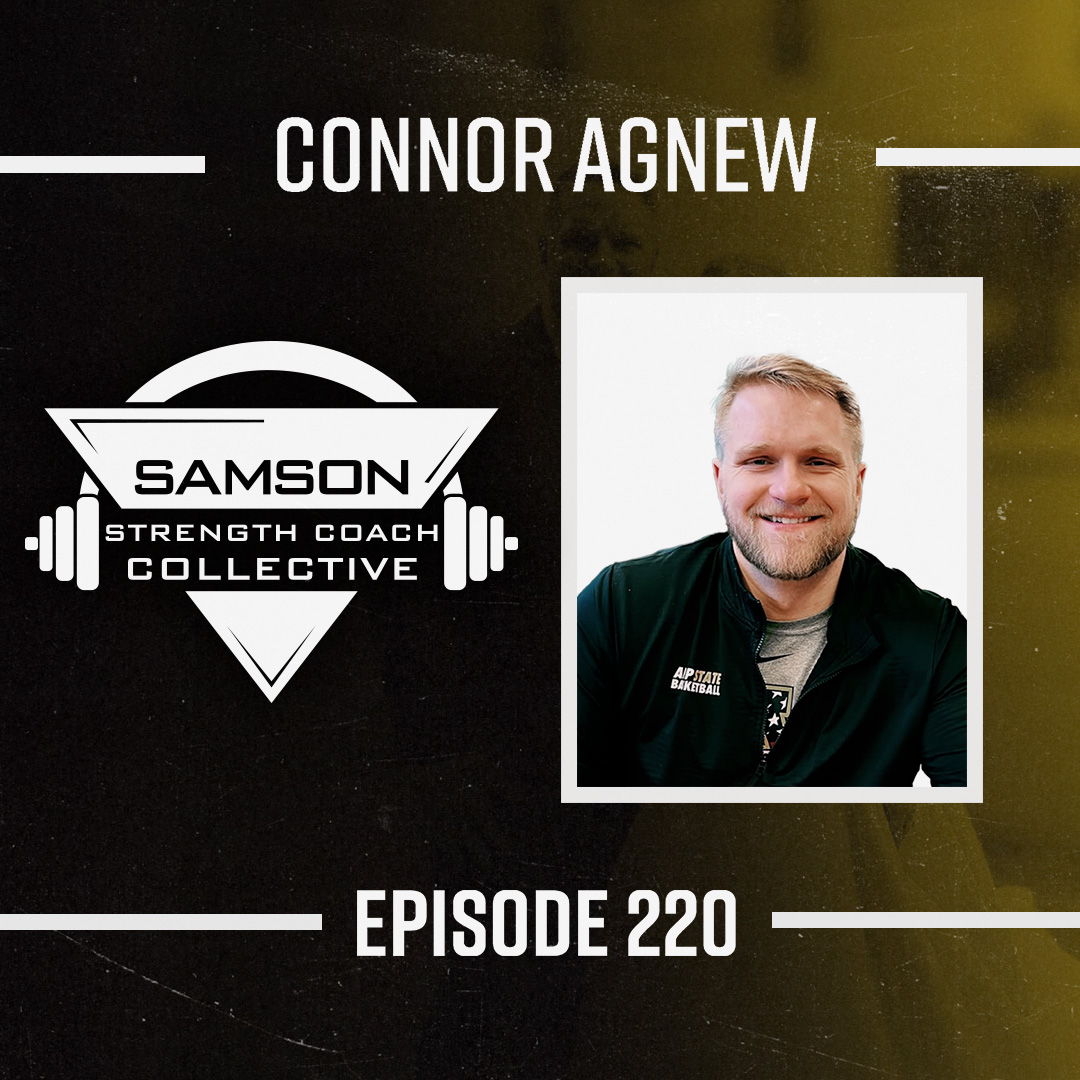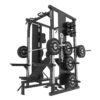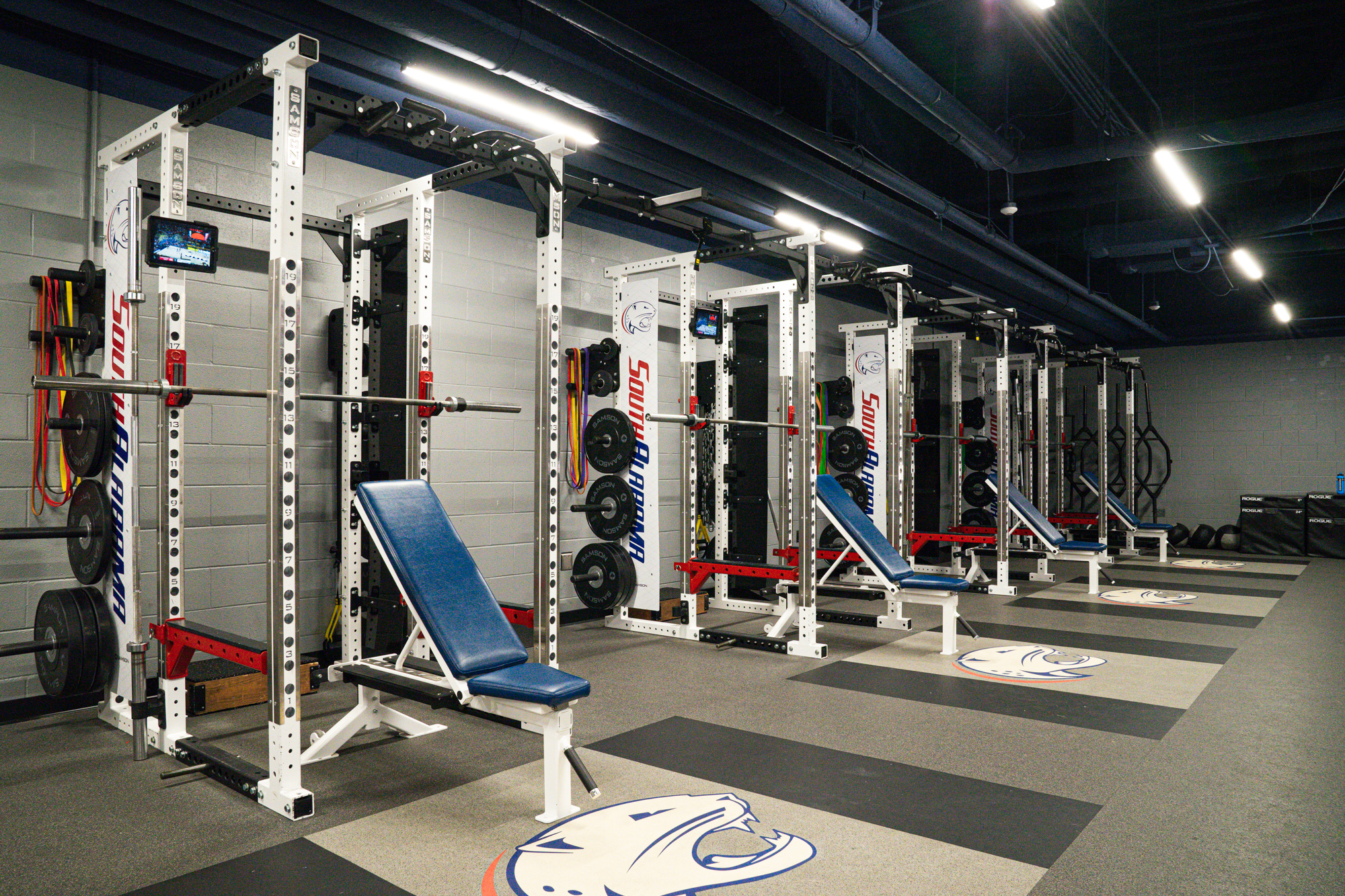In this episode of the Samson Strength Coach Collective, Connor Agnew tackles the major changes shaping collegiate athletics today. With the rise of NIL and impending revenue sharing, Connor shares concerns about the long-term future of Olympic sports, the visibility of strength coaches, and the growing pressures placed on the profession. He offers valuable insight into how coaches can stay relevant—by advocating for themselves, tracking objective data, and addressing the mental health toll of the job. This conversation is both a wake-up call and a rallying cry for strength coaches to evolve and lead with purpose.
Key Takeaways
- College athletics is shifting rapidly with NIL and revenue sharing.
- Olympic sports may be at risk under new financial models.
- Strength coaches must track and present data to prove value.
- Burnout and mental health remain critical concerns in the field.
- Career sustainability requires rethinking how strength coaches are perceived.
- Advocacy, representation, and communication with administration are essential.
- More strength coaches lead to better athlete safety and satisfaction.
- It’s time for the profession to stop accepting the status quo.
Quote:
“I see some issues with how strength and conditioning is represented… why do we as a profession just accept these things?”
— Connor Agnew
Spotify • YouTube • Apple Podcast
Never Miss An Episode Join Our Newsletter
Connor Agnew
I do feel like there needs to be a little bit more of strength and conditioning putting themselves out there in order to be taken seriously a little bit more. ⁓ And maybe, maybe I am beating a dead horse. Maybe I am the old man who yells at cloud.
Right now, but as I get older and as I again take on more responsibility I do see some issues with how strength and conditioning is represented I see some issues with the ease of which strength and conditioning coaches can be overlooked and I see some issues with the quality of strength and conditioning coaches careers And so there’s big issues with those things, right? Those are things that lead to us having high turnover burnout for strength and conditioning coaches watching
amazing coaches leaving the collegiate sector because of these major issues. So why do we as a profession just accept these things?
What’s going on, Sampson Strength Coach, Collective Listeners? On today’s episode, you’ve got just me, and I apologize. You know, it’s not every day that you get to hear somebody ramble and rant for 30 minutes. And, you know, hopefully I can provide you with something that is beneficial to your coaching career, to your day. Maybe I can make you laugh a couple of times. That’d be pretty cool. And I’d very much appreciate being able to do that. And I appreciate you giving me your ears. And once again, I appreciate Sampson for giving me the platform.
I won’t go on a Milky Way and Snickers rant like I did last time, but ⁓ this is going to be somewhat of a stream of consciousness podcast. You can consider it like Catcher in the Rye, JD Salinger, which I can’t believe I just compared myself to one of the best writers of all time. I’m certainly not that, I’m just a strength and conditioning coach, a humble strength and conditioning coach, which is also probably not true. I’m not very humble. But ultimately I’m excited to be able to speak and discuss a couple of things that have been on my mind this summer.
⁓ this year, honestly, within the past couple of years, ever since I joined strength and conditioning, some things that ⁓ I’ve been concerned with and some things that I think are worth noting. In getting to meet other strength coaches recently over the summer and talk about some things that are concerning for us, ultimately, I have a lot of concerns. And I think a lot of you strength coaches out there do as well. If you’re within the collegiate sector, if you’re in the high school, if you’re within tactical, maybe you might be.
a little bit concerned about it because there might be outflux of coaches, if you will, from the collegiate sector because of some of the concerns I have, honestly. One of my main concerns right now is the entire revenue sharing piece. ⁓ Where’s the money going to come from? And if you look at major athletic departments, ⁓ it’s not as much of a concern for some of them, but for the minor athletic departments, for schools in the mid-major or lower major levels, it is a little bit concerning.
I had a coach, friend of mine, go down to a talk for basketball coaches. And during that talk, what he said specifically was, sorry, I didn’t even mention who gave this talk, okay? I don’t have a specific name for you, but I do have a general idea of who this person is. Apparently he’s the one who’s been doing all the reporting on all the White House legislation coming out on NCAA ⁓ payment.
NIL on revenue sharing all these things and brand new things that have come apart. And he said it’s going to be the Wild West for the next couple of years, which it already has been. So I don’t really expect that to change too much. But what he did also say when giving this talk was that he believes within 10 years, the structure of college athletics is going to change completely. And it’s going to look rapidly, drastically, whatever word you want to describe it as different. And it’s going to look honestly a little concerning for Olympic sports in my opinion. And so.
what are some ways that us strength and conditioning coaches can help combat this? What are some ways that we can kind of look at these things and come up with ideas before we run into these problems down the line? And so the reason I think it’s going to be a problem is because during this talk, what he said was he believes schools are going to go into the LLC format. And it’s actually not even the schools. It’s going to be the specific sports ⁓ teams. So you will see something like.
I don’t want to name any specific teams because I don’t know who’s going to do it first. Well, actually do know Kentucky did it first by creating an LLC for their athletic department, but there’s no specific LLC for the football team or whatever. So we’ll say the Connor Agnew football team decides one day that they are not happy with having to share revenue with the rest of the school. They are not happy with how things have gone down.
specific requirements of admitting students, whatever it may be, right? There’s all these crazy things that happen within ⁓ the football, basketball, whatever team it may be in the school. And so they’re going to decide one day to split off. Obviously they’ll have to have other teams split off with them, right? But they will make their own LLC. So it’d be the Connor Agnew football team, LLC. And then how it’ll work from there is the school or sorry, the school will require basically payments for Connor Agnew’s name, image and likeness to be used. So.
The Conor Agnew football team will pay the school for the logo. They’ll pay the school for the rights of the stadium. They’ll pay the school for the ability to sell t-shirts and merchandise with the Conor Agnew University logo on it, whatever it may be. And then they will take the profits from there. And then we’ll go essentially into a pro model. And so when that happens, ultimately,
there’s going be some crazy deals with this, right? So if the first part is everything on the football side, there’s going to be a lot more positions. You can imagine that the football strength and coaching coaches will be safe. You can imagine that, ⁓ you know, there’s going to be even more GMs. There’s going to be even more analytics guys. It’s going to go full pro model. ⁓ And so this is all assumption, right? This is all what the person has been covering this ⁓ sort of setup for the schools and universities and government legislation and how it’s all been ⁓ going on, assumes will happen.
So when these teams separate, again, there’s going to be a decent ⁓ outpouring for football and it’s going to be okay for football. But what about the rest of the Olympic sports? What about the ones who don’t generate revenue and the ones who rely on revenue generated from football to be able to travel and to be able to do all these things? And so that’s my concern. That’s my chief concern is the way it is going. I do not see money going out of college athletics, even with this brand new legislation. ⁓
that’s being set up by the Trump administration. I can’t really speak to that 100 % too. So this may be the dumbest talk I’ve ever given, right? Because ultimately the legislation for pay for play came out and we can’t do this anymore. I don’t know. But I’m just gonna go based off of what I knew previously to that legislation coming up. And so ultimately it’s very concerning to me about what it’s gonna look like for Olympic sports in the future. And then obviously if it doesn’t look good for Olympic sports in the future, it does not look good for Olympic straight and conditioning coaches in the future as well.
So I remember I gave a bleeding heart speech about, you know, how we’re going to hire more strength and conditioning coaches, how strength and conditioning coaches can honestly be the most effective role. And, know, if you’re a dietician or if you’re an athletic trainer or physical therapist who listened to this podcast, please don’t say that I’m not trying to say whatsoever that strength and conditioning coaches can execute your role or do whatever they’d like to. That’s not correct. But what I am saying is that when I look at what I do with
men’s basketball here, there’s a blend of lot of different careers within it and I take advice from each of the professionals who don’t have the time or bandwidth to be able to deal with one specific team. I’ll take their advice, I’ll take their inputs, I’ll take their direct programs, whatever they want me to apply and use it directly with the team. And because of the nature of strength and conditioning, I have the world’s most basic understanding of nutrition. I have a very basic understanding of athletic training. ⁓ Not at all to say I could be an AT or PT or whatever it may be.
But I do understand these things and so I can execute the things that these professionals want us to see used with the team specifically. And so I remember I gave this giant speech to a university and I said, you know, we need to hire more strength coaches because ultimately if you want to see athlete satisfaction go up, you need to have more strength coaches who can help dispel the messages from these other areas and help ensure athlete safety and help make sure that they feel protected and make sure that, you know, the
practitioners that are not strength and conditioning coaches also feel like they have a voice and are seeing their work done correctly. ⁓ And at the end of this speech, it was basically said that we will be hiring no more strength and conditioning coaches. ⁓ And part of my belief is just because of the concerns about what everything looks like with the future landscape of collegiate athletics and concerns about where money is going to come from for Olympic sports. It is concerning to me, one, because I feel like college athletics is just really beneficial for everyone.
I feel like not just football, not just basketball, not just baseball or these revenue generating sports, but the teams that make a difference on campus with their community outreach, the teams that can be role models for younger boys or girls who want to grow up and understand that there is a process of putting in hard work to be able to get to where you want to be. ⁓ And so it is a scary time for me to look ahead for collegiate athletics on the Olympic sports side and understand.
what areas we can improve or what are the things that we can do to improve strength and conditioning coaches stance in the future. And so again, a little bit of a stream of consciousness podcast, but it’s been something that’s been on my mind. It’s been something that’s been on the mind of a lot of Olympic strength and conditioning coaches that I’ve spoken to recently. And so my question, or I guess I don’t even have a question, but I guess my statement would be that strength and conditioning coaches need to start thinking of solutions before we find the problem. We need to start thinking of what are some ways that we can promote our jobs and
understand that the more strength coaches we have on staff, the better product we can produce. I was speaking with a strength and conditioning coach just recently who’s been in the field for 30 years. And that coach was saying, you know, when I first started out, I had 20 teams. And that is the reality for still a lot of strength coaches, but at least for schools with higher funding, it’s least schools ⁓ that have seen the benefits of strength and conditioning have invested into our departments. And so what benefits do we actually provide? I think we need to be able to communicate that effectively to administration.
What benefits does hiring extra strength and conditioning coaches actually provide? And then ultimately, ⁓ what do strength and conditioning coaches really do to help enhance an athletic department? And if we can lay these out for administration, then hopefully we can understand, or hopefully the department can understand in the future that this is a beneficial position because I do feel like this is one of the first positions that easily kind of gets cut out of people’s minds because ultimately you need a basketball coach to still play basketball, right?
But do you really, and if you really think about it, you need an AT to still play basketball. You need, ultimately you still need a videographer because you need to be able to watch film and all these things, At the end of the day, do you really truly need a strength and conditioning coach in order for the game to go on? No, you certainly do not. So when it comes down to administration and the way they view strength and conditioning, it is a very nice bonus. We can help develop culture. We can help with the health of our overall athletes.
I don’t think a lot of administrations are a hundred percent bought in on how much we prevent injuries. I think that’s for a multitude of reasons. But when I think about positions that we truly need, obviously I’m going to advocate for training conditioning coaches, but I do feel like administration feels like we’re one of the first ones to be able to be cut. Because if you think about equipment, everybody needs clothes to wear. If you think about athletic training, there needs to be an athlete trainer by law mandate in order for the event to actually occur.
There needs to be a coach for somebody that actually coached the basketball team and there need to be athletes to actually play the game so When it’s down to cuts and about when we evaluate programs that don’t really necessarily generate money anymore if we really ⁓ don’t have You know the ability to continue out with these sports then And I’m not saying we’re gonna get to that point, but I do think I am a little bit of a catastrophist if that’s a possible word
But if we does get to that point, how do we protect ourselves before we get to that point? And how do we make sure that training conditioning coaches can be protected? So again, understanding and demonstrating our value to strength conditioning coach, or sorry to administration. I think we need to start tracking injury rates in a way possible. I don’t know, I’m open to suggestions and I would love to spearhead this movement if I possibly could, you know, and do whatever I can to help assist other coaches at other schools. And I think we need to rely on
Athlete satisfaction surveys. I think we need to have raw statistics that we can actually bring to administration and say, as a strength and conditioning coach, we did this and this is how we provide value to the department instead of just being the vibes guy or the guy who plays music really loud in the weight room or the guy who ⁓ has a lot of fun. ⁓ And our athletes have a lot of fun in the weight room too. And that kind of brings me into another point of it, which is I do think strength and conditioning does need to get taken more seriously. And because of that, think strength and conditioning coaches need to do a better job of allowing themselves to be taken more seriously.
I get frustrated a little bit when I go on Instagram or TikTok or ⁓ Twitter when I see videos that are just funny of strength and conditioning. ultimately, I do see a lot of videos that are ⁓ based around science. do see videos. You look at guys like Joey Burgles who post high quality content of what they do with their teams.
I see a lot of videos that perpetuate the stigma of being a dumb strength and conditioning coach with a caffeine addiction who likes to cuss a lot and can’t show up to administration meetings appropriately. And that does not help us. That does not help us whatsoever. I see a lot of things and content that are like funny and don’t get me wrong, I’ve posted the same content before too, but as I get older and as I’ve taken on more responsibilities within strength and conditioning, I do recognize that
these things can hurt us. And so how do we also change the image of strength and conditioning coaches? How do we make sure that we’re taken more seriously? We’ve gotten all our master degrees at this point and it certainly hasn’t worked either. So there’s something that ultimately has to change within the perception of strength and conditioning coaches. And I do think it has to come from strength and conditioning coaches themselves. And I think the jokes about caffeine addiction and the jokes about
Being the dumb guy who just likes lifting weights or how did you become a strength coach? Well, you know, I sucked at my sport So I just went into the weight room again These are all things that I’ve said over and over and over again but understanding that strength and coaching coaches need to get taken more seriously in the future is something that I’m trying to limit my language of or limit my sharing of the content of that has a negative connotation towards strength and conditioning and so again, I don’t really know what I’m 100 % trying to get at with this, but I am just trying to say that
I do think strength coaches will need protection in the future. I do think the easiest way that we can provide that protection is by developing more serious reputation for our career and by developing objective, 100 % analytical ways to show that we make a difference to an athletic department. Because a lot of our side, I mean, this whole podcast is based around the art side of strength and conditioning, right? Stuff that we can’t really measure that much about enhancing the student athlete experience, how to do work-life balance as a coach itself, right? Like all these things are so beneficial, but.
we talk about all these things, how can we show that we actually enhance the student athlete experience? Because in my school, State, one of the pillars is quite literally provide a world-class student athlete experience. And I would like to think I do that. And I’d like to think that I enhance the player’s experience when they’re here. But how do I actually put pen to paper and demonstrate that I do those things? And so again, is it surveys? Is it ⁓ more meetings with the administration? Is it regular check-ins? Is it following more of a business model?
where you come up with proposed plans, you track every single thing that you do, right? We just finished up summer training here, okay? And we had, in my opinion, the best summer training that we’ve ever had with our team, men’s basketball. And one of the first things that I mentioned to our coaches was, well, we put on X amount of weight for our weight gain guys. We lost X amount of weight for our weight loss guys. Our conditioning test scores on the 30-15 IFT.
So the largest improvement that we ever saw over the summer. And I have a good relationship with our staff, but we like to make fun of each other every once in a while. And they’re like, all right, Pat on the back, man, you did a great job, right? But I used to not share those statistics and I used to not say those things. And then I noticed that at the end of the year meetings, there’s not really a lot to go off of. And there’s not really a lot of stuff to hold me accountable to if it didn’t go well or say I deserve a raise at the end of the year because it did go well. So I do think.
with all the stuff that we track, do think that strength coaching coaches need to make that information more available to their coaches instead of just saying at the end of the year, well, we look strong, we look like we’re in good shape, so great job, right? We need to have more objective data to be able to show our coaches these things and we need to not be scared to show our coaches these things. And it’s so funny because I do feel like we have a lot of humble strength coaches out there. I do feel like we have a lot of people who don’t want to present themselves as cocky or bragging or, ⁓ you know,
basically only making themselves results-based instead of process-based with the athletes or not focused on the athletes. But I’d like to more money and I’d like a raise at the end of the year. And so how do I demonstrate that besides just straight up wins ⁓ is by giving them ⁓ data that really matters, like statistics that are honestly a little bit scary to provide as well too. And so we can talk about injury statistics, right? Injury statistics get really scary for strength and kitties and coaches because
Once you say things like we had no, and this is a true stat for our team over the past two years, we’ve had zero games or practices missed in season due to non-contact lower body injuries. And that’s an exciting stat, right? It’s very cool. But what happens this upcoming year, if we have two hamstring strains, and I mean, I’m seriously, I’m going to knock on wood. Give me one second. I’m literally going to go to my door real quick.
and I’m back, what happens if we are able to, ⁓ if we see these injuries occur and then, well, now I’m on the hook because I was bragging about how many less injuries we had, right? And so it’s certainly a scary statistic to bring up, but at the same time, I do feel like what we have done in the weight room, what we communicate with the coaches on the court, how we work with the rest of our sport performance staff, including our athletic trainers and dietitians.
and sports psych and PTs and all these people who make a difference. I do feel like the coordination we do, a lot of it comes down to the strength and conditioning coach. And so I would like to use that stat to be able to say, we were as available as possible for each game and we were able to have success because of those things. And so I do feel like there needs to be a little bit more of strength and conditioning putting themselves out there in order to be taken seriously a little bit more. ⁓ And maybe, maybe I am beating a dead horse. Maybe I am the old man who yells at cloud.
Right now, but as I get older and as I again take on more responsibility I do see some issues with how strength and conditioning is represented I see some issues with the ease of which strength and conditioning coaches can be overlooked and I see some issues with the quality of strength and conditioning coaches careers And so there’s big issues with those things, right? Those are things that lead to us having high turnover burnout for strength and conditioning coaches watching
amazing coaches leaving the collegiate sector because of these major issues. So why do we as a profession just accept these things? And why do we as a profession just say, yeah, you know what, it’s cool. I’m gonna go spend five years in college, build my resume up, and then I’ll be able to go get whatever high school job I want or tactical job, right? Which is also not true because you have to be really high quality, straight in the kitchen coaches in the other ways as well too, right? But ultimately, why do we accept these things and take it as a reality of the field when
I do feel like there’s more changes to be made and more things that can be done to take ourselves seriously. So I think it’s ⁓ in the words of Michael Jackson, you know, I’m looking at the man in the mirror. And ultimately I want to do a better job of representing strength and coaching coaches in the future. I have a platform that Samson has amazingly given to me and I’m shocked they haven’t pulled it away from me at this point. ⁓ Thank you so much for everything you guys do. But ultimately I want to represent us better. I want to represent us well.
And you know, to give you guys more background of this, because again, I’ve got time. I’m just talking to a camera right now of why I’ve really been thinking about these things recently is that, ⁓ you know, our director here has left and I’ve been promoted to interim director of Olympic strength and conditioning here. And so for the first time in my career, I now oversee a strength and conditioning staff. And so instead of just helping out our younger assistant strength coaches and saying,
Hey, good job. Maybe you can do these couple things a little bit better, right? Or I appreciate the help. Here’s a burger on me. We’ll go out and get lunch one day, right? ⁓ If these things have gone to the wayside now, and I understand I’m responsible for a staff of strength and conditioning coaches, that’s scary. Honestly, if I’m being real, I mean, I’ve been acting in this role for just a month, right? ⁓ There’s strength and conditioning coaches on the staff who I know deserve a raise and I’ve got to go fight for them.
This is why I think about these things now. less of just about me and surviving. It’s more about representing strength and conditioning as a whole to our athletic department, which I think our athletic department does support our strength coaches. And I do feel like we’re compensated extremely fairly. And they’ve done right by us, but ultimately ⁓ it’s not the case for everywhere. And so that’s what’s got me thinking about it more. And the more I hear stories from other people, I think about the strength and conditioning coaches who have actually done something.
I think about Jess Givens, who was on the podcast just a couple of weeks ago, who said that, you know, she understood that she had to leave her situation, but she wanted to be a collegiate strength and conditioning coach. So then she found a situation that worked better for her. And she went to therapy. Why are we not open, more open about our solutions to these things? I applaud Jess on what she did because I’ve had strength and conditioning coaches on the past who have told me many times that they seek some form of mental health treatment.
And they are very scared to announce these things in public because there’s a stigma around it, which, you know, that’s part of a larger issue as well too. But like, if we’re in a field that has a lot of high burnout and low mental health ⁓ experience and in low mental health quality, like why are we scared to admit these things? You know, I mean, I’ve talked about it multiple times in past. I’ve seen a therapist myself, I’ve suffered with depression and ⁓
ADHD, ADD, whatever it’s called now. I got diagnosed like 10 years ago. And all I know is that sometimes I have trouble focusing and sometimes I hyper-focus. But I’ve had struggles myself with these things and I bring it up to other coaches and a lot of them can relate. But then I feel like those are only in very personal conversations as well too. So again, it’s a little bit more of mental health topic right now. I don’t mean to trail off even though the entire episode has been one long trail off.
All I’m saying is I applaud the coaches who take steps to do the things that will actually help improve their experience. Because at the end of the day, this is a sick job. This is so cool what we get to do. I mean, quite literally we get to lift weights when we want. I haven’t been to a commercial gym in years. mean, seriously, I won’t even touch a commercial gym. couldn’t imagine walking into one. I get to watch athletes grow and develop. I’ve got a red shirt on our team right now who made the most mistakes I’ve ever seen as a freshman. He’s got to hold the world record.
And I get to still watch him make mistakes as a junior now, but I get to do see his thought process change and I get to see his accountability change. And then I get to imagine how he’s going to be as a father and how he’s going to be as a husband and how he’s going to interact with people because he is a amazing young man. And so he’s just improving his situation. He’s improving who he is as a person. And so he’s going to be even better in these areas in the future. I get to watch college basketball games for free.
I get to steal snacks from the fuel station. Like all these things are so cool. And so I feel like as a career, we kind of get bogged down with the negatives. And again, like there are things that we can change the things that we can focus on. so I get concerned with how strength coaches represent themselves. I get concerned with the lack of action by a lot of strength coaches. And that is not whatsoever to take away from what a lot of strength coaches have already done to improve our situation. But I do.
feel like when I hear about the satisfaction of the career right now, it feels lower than when I talk to older coaches who have been in the field for longer and who had worse situations than us, way worse situations than us. And it makes me wonder why did they enjoy the career that much more? And I think it was because they understood that it was a young career that’s still developing, especially super young at their time.
And so they were taking active steps to change their situations. And I felt like they were doing a lot. And now I feel like I hear a lot of complaining. And so this all ties back in once again to my concerns about the future of strength and conditioning with this revenue sharing, especially within the Olympic sports department. And with all those things and those concerns in the future, strength and conditioning coaches can easily be the first positions cut. We can go back to the times when one strength coach had 20 teams.
for a lot of these athletic departments and ultimately what are we going to do? But what are we going to do to prevent that from happening? What are we going do to understand that that’s a possible problem in the future and then what are we going to do as strength and conditioning coaches to continue to improve the field? Because a lot of the strength coaches earlier on laid the groundwork for us coaches to be able to complain right now. So instead of complaining, why don’t we continue to progress and move the field further?
So I don’t know, again, am I an old man yelling at a cloud? Potentially. Am I somebody who doesn’t have a good grasp on strength and conditioning as a whole? Possibly. I’d like to feel like I do because I get to talk to so many strength coaches on a weekly basis. when I talk with tactical strength coaches, when I talk with high school strength coaches, when I talk with others that are not within the collegiate field, a lot of times,
it feels like they think college training and conditioning coaches can be kind of dumb. And I say that kind of laughing, not in an intelligence standpoint, but in a, would we put up with our situations, how it may be, right? I was called for a job recently that would have paid a pretty significant amount of money, 80 to $100,000. The work week would have been 32 hours per week. And
I wouldn’t have to travel, have to do anything. I’d have to live in a city I didn’t want to live in. So that was a big part of why I said no. But the biggest reason why I said no is because I love my job. I can’t leave it to completely go into a different section of strength and conditioning.
Connor Agnew (28:02)
I love my job. Like I do, I really love my job.
And so it was really hard for me to say no to a job that was awesome and had a lot of benefits to it. like, I don’t, I want to be in this profession. And like the joke I say to other people is like, I’m sick in the head, you know, so I just want to be a college strength coach. Like, again, that language doesn’t help any of us, right? Because it makes it again, like if you’re a collegiate strength coach, you’re just a, something’s wrong with you to be able to do this job. But like, I love this job. I don’t want to leave this job.
There’s so many other strength coaches like me. Again, what can we do to help build up our reputation? What are the things that we can do to help solidify our position, help make sure that if college athletics goes in a scary direction, that our jobs are protected. ⁓ And you know what? Even if it doesn’t go in that direction, how do we get more money? Because it does suck when assistant coaches get paid more than us. It does suck when head coaches get paid five, 10, 15 times what we make as well, right?
Ultimately, I like the thing I contribute a lot to our team. And again, I feel like here at AppState, I am fairly compensated and they do a great job with that, but it’s hardly the case for a lot of schools and other strength coaches that I know and speak with. So how do we bring a little bit more legitimacy to this profession? I guess is the main question and the main thought that’s been on my mind. Again, especially since I’ve had to step up as interim director and I’ve had to represent other strength coaches. So, you know, just…
I don’t know, I mean, I’m gonna sound like an almost cuss here. I’m an idiot ⁓ when I say these things, right? But like coming to all of our administration meetings with action plans and taking notes and asking questions instead of being upset that I have to be in these meetings. ⁓ Coming up with suggestions, following through on things quickly, like trying to be the best possible coworker that I can be so that people take our profession seriously and believe in what we’re trying to do as training conditioning coaches. Because again,
A lot of times I feel like in just other words I’ve heard from strength coaches too is it’s very easy to just focus on the weight room stuff and not focus on a lot of the outside work and a lot of the outside weight room things that are important like dealing with administration and conversations that we have. think back to my episode with Andrew Rafferty, right? Where he was like, just treat admin like normal human beings instead of being a weirdo, right? So if we do that, that’s already gonna be a better step. But then I think back to Sarah Ramey as well too.
who encouraged me and encouraged our listeners in those episodes to take part in special organizations, ⁓ to participate in salary surveys. Like guys, if you don’t put your salaries in for the salary surveys, how are you supposed to see, you can’t complain about money and then not put your salary in for the salary survey. It’s like, you can’t do that. And you can’t just not provide information for other people, ⁓ you know, but take part in special organizations, take part in the Sunbelt Straightened Conditioning Community, take part.
in the NCAA communities and the CSC, NSCA, CSCCA communities, whatever it may be, right? And actually be active members within their discussion issues. Those things do at the end of the day matter and those things do drive change. I know for a salary survey that we’ve done personally just for Sunbelt basketball straightening conditioning coaches, we did that. And I know three coaches who after that survey got a race. Like sharing information helps too, man. Like, and so ultimately,
What are more steps that we can take instead of just saying, collegiate athletics sucks and this is a bummer profession, so I’m just gonna either stick with it or burn out and leave. Like, why can’t we take active changes and why can’t we be more active in what we try to do? Yeah, you guys know. So I guess a very long rant and a long-winded ⁓ thing to discuss, but it’s just been on my mind recently. And then so again, that’s also why I appreciate it.
people who come on the Samson’s Training Coach Collective and people who give us their opinions and give us their ideas because I have grown immensely as a coach since doing this podcast. And I appreciate Samson for allowing me the opportunity to do that. Who’s also a great company by the way, all right? And somebody who does something right in the strength and conditioning world, which we all beg and plead for, ⁓ And ultimately, I just appreciate it so much because I get to talk to other coaches, I get to hear their ideas and then,
You know sometimes I do a disservice to you guys and I’ll ask questions that maybe I’m a little concerned to ask on air because I don’t want to push the limits of What that coach is willing to share? So maybe I can do a better job there I know I can do a better job there, you know But then I also get to learn some really really interesting stuff and some really interesting perspectives and stories that you would be very surprised to hear that would also help drive the field better too, so in my mid
podcast rant realization, I’ll also say that I can do a better job of asking better questions too. ⁓ But again, I just wanted to get that off my chest a little bit. I wanted to talk about that a little bit because there’s frustrations I have even in my great situation. So why not be a doer? Why not be the one who can make those things better? And I’ve been recently put into a position where I can have a lot more say in those things and I can have a lot more. ⁓
way of going, I can have a much better way of going about those things. So my challenge, I guess, when I say the younger strength coaches too, is not wait until you get put into a position where you have more ⁓ leadership role or have more of a direct face to face time with admin. ⁓ Why not create that face time earlier? Why not create those ideas earlier? And why not push for the field more earlier? Because that will just help everybody out in the field more. So again, I appreciate this platform. I appreciate getting to meet these coaches and I appreciate the ability to
⁓ interview and understand different perspectives and see how everybody goes about their days. ⁓ And I appreciate the ability ⁓ to get on a podcast on Wednesday night and have editors who will understand when an episode’s coming out late for me for the recording for the week and still edit it for me. So I appreciate ⁓ everybody over at Samsung for that as well. ⁓ yeah, I don’t know. I mean,
Other recent updates, you know, if I want to just take a little bit more of your gracious time, which I’d appreciate. I got married in May. So maybe that’s also why I’m thinking about this stuff more too is like, you know, I was new, I was going to be with my fiancee girlfriend now wife for the rest of my life because she’s literally the best thing that’s ever happened to me. But I think also think about those things more too, because I’ve got a full contract that I’ve got to hold up now on my end. And I’ve got to make sure that she’s happy too. And I’ve got to make sure that
I’m not bringing strength and conditioning problems home to her and being angry about it. So I think that’s why it’s been on my mind recently too. So I got married in May and that was really cool. Then I had my honeymoon, which I gained 12 pounds on, which is also really cool. A lot of Pini Coladas, lot of Dos Equis, which I very much appreciated. And we got to do excursions, which was awesome. Went sailing with somebody who spoke no English and I barely speak Spanish. I would like to say I speak Spanish well, but I certainly don’t.
⁓ and so that was quite the experience. The nicest guy I’ve ever met, took us out into the middle of the ocean or the Osh as he called it. And, we snorkel and then we made it back home, which was very cool. I got a little concerned at one point. So, ⁓ you know, honestly, if you, there’s anywhere you have clear lines of communication, ⁓ in, in clear understanding of each other, it’s when you’re out in the middle of the ocean on a sailboat and the storms coming in. So that was really sick. Was going to get married. ⁓ I got Lyme’s disease.
which is crazy. So check yourself for ticks. One day, half of my face stopped working. And honestly, everybody thought it was a stroke, which was very fair because that’s kind of one of the main symptoms. But none of the other systems persisted. went to the doctor and they said it was Bell’s palsy. And then a couple of days later I got told it was Lyme’s disease. So I had to take antibiotics. Now obviously more of my face is working. But if you go back a couple of weeks during my podcast, you’ll see I’m talking on the side of my mouth like this. And that was one of the main pieces of evidence I showed.
to our staff or directors of doctors that we have and showed them. And I just said, hey, I think something’s seriously wrong. And they looked at the videos and said, yeah, it’s been going on for a little bit. So take yourself for ticks. And then outside of that, I don’t really have many more updates. had an awesome summer of training. I our guys look good. Stuff’s always cool. I’d like to win some basketball games. If you’re another Sunbelt basketball training coaching coach, listen to this. I hope you’re good. I hope you’re worse than us though.
⁓ And yeah, those are all pretty much the updates I have. So three minutes of personal life updates that you probably do not care about, but I appreciate you listening to anyway. And about 37 minutes about my feelings of the current state of affairs within strength and conditioning. And I don’t want to be the doomsdayer. I want to be the guy who’s saying this guy won’t be chicken little, right? Screaming about revenue generating or revenue sharing is going to destroy Olympic sports, whatever it is, right? I certainly hope that’s not the case because that’s where my job is.
But I do think strength and conditioning coaches need to talk about these issues. I do think we need to be aware of these things that could possibly come down the pipeline later on. ⁓ So if that’s the case, we need to be aware of those things. Then we need to know how to make ourselves more respected and more understood within ⁓ college athletic departments. And if that’s the case, then maybe we can prevent bad things from happening to our profession. So again, thank you for listening. I appreciate your time. I was wrong on my math with the time as well too. So not ultimately not the most time.
not 37 minutes, maybe 34 minutes talking about the current state of affairs. But again, I appreciate your time nonetheless. And you know, I do want to have an open invite to any listeners who ever want to reach out to me want to talk, want to discuss anything that I might say in a podcast, want to tell me I’m a dumb dumb for believing any of the things I may believe. I love to converse no matter the conversation. So please reach out to me anytime. And you know, during the solo episodes, I always like to thank Samson, but I truly can’t thank him enough for
One, just being the easiest possible company to work with. ⁓ If you guys need an equipment company to work with, it is so easy for me to recommend Samson. I can’t even say it over and over again, not because I get to host their podcast, just because of the people who work there, from the owners to the marketing directors to anybody I’ve ever had a conversation with at that company is literally the coolest person I’ve ever met. And then also the easiest person to work with ever.
and will always pick up my call and always make me feel heard and always make me feel like this is something that I want to continue on as long as they want to continue on with me as the host. So I want to thank Samson again for just being the best. And I want to thank them for allowing us to have this platform. And I want to thank them for allowing me to become better as a coach by hosting this podcast. And I want to thank you to the listeners. Even if there was one of you, I’d still keep going. So.
Just know that and keep that in your back pocket if you’re the one. And I appreciate you making my voice feel heard as well too, because every once in while it’s good just to talk and get these things out with a completely objective listener. Somebody who I don’t know in person isn’t just gonna rub my back and give me a glass of warm milk and tell me everything’s gonna be fine. So I appreciate you greatly. I appreciate everybody here. I’m in a grateful mood and I appreciate you listening. I hope you enjoyed today’s episode. Thank you so much.


















